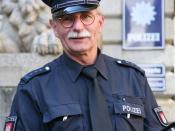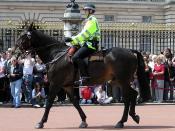HISTORY OF LAW ENFORCEMENT
The early police forces in nineteenth-century America were modeled in part on the Metropolitan Police of London, formed in 1829 by Robert Peel (hence the nicknames "peelers" and "bobbies"). But American police came to differ from the police of other Western nations in several important ways. First, they have always been a part of local government, unlike other countries where the local police are a part of a nationally administered force. Second, because of their local roots, police departments appeared at different times throughout the nation. In general, big eastern cities created police forces first, with smaller cities lagging well behind. Third, as a part of the executive office of the city, police departments have been administered separately from state and county systems of criminal justice. Historian Wilbur Miller has argued that this final difference accounts for some of the more obvious contrasts between American and English police: American police have seen themselves as administering justice on the street; the English, as representing law, or the unwritten English Constitution.
The kind of police Americans knew in the early nineteenth century was descended from the medieval police of England--a constable and watch system composed of a volunteer night watch, who patrolled the city, and a daytime constable, who supervised the watch and charged fees for his services. Most night watchmen, however, were actually paid substitutes for volunteers and traditionally were drawn from society's unemployables. When Dogberry in Shakespeare's Much Ado about Nothing selects a night constable from among the watchmen, he picks "the most senseless and fit man," whom he orders, "You shall comprehend all vagrom men." As for sleeping on the job, Dogberry offers that he "cannot see how sleeping should offend; only, have a care that your bills [weapons] be not stolen." In this scene,


